Research Report: Global Branding of Organic Coffee in the UK
VerifiedAdded on 2023/01/19
|27
|7579
|97
Report
AI Summary
This report presents a comprehensive analysis of the global branding strategy for organic coffee in the UK market, with a specific focus on Nestle. The research begins with an introduction outlining the scope and objectives, which include developing branding strategies to drive growth in the UK market. The report explores the health benefits and quality of organic coffee, identifies key factors driving its growth, and determines effective global brand strategies for Nestle. The methodology section details the use of both primary and secondary research methods, including questionnaires and thematic analysis. Findings from the research are presented, focusing on consumer behavior, market segmentation, and the importance of health and environmental considerations. The report concludes with recommendations for Nestle, emphasizing the need for effective brand positioning and relationship building within the UK market. The study also reviews alternative research methodologies and discusses the effectiveness of the applied methods in meeting the research objectives.
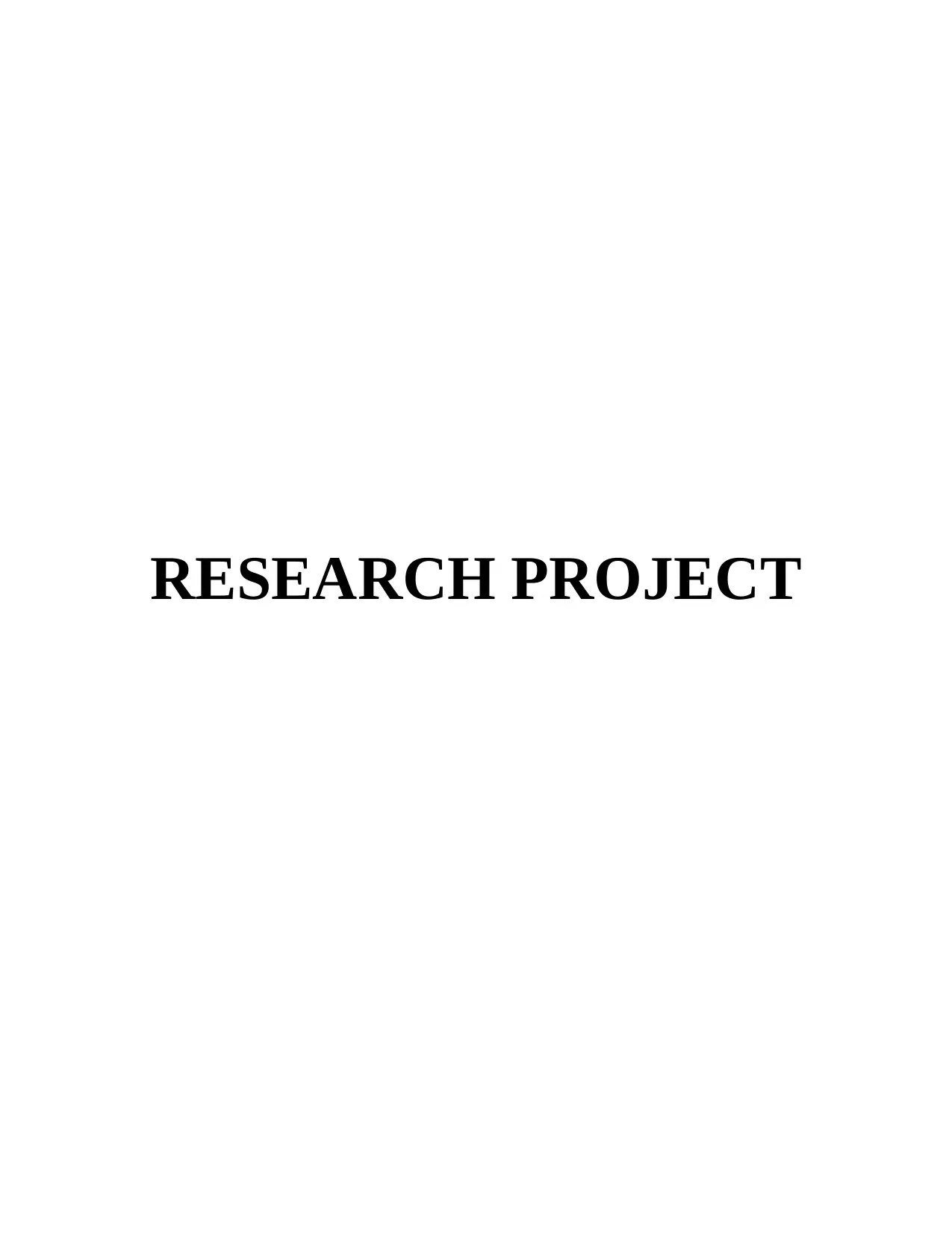
RESEARCH PROJECT
Paraphrase This Document
Need a fresh take? Get an instant paraphrase of this document with our AI Paraphraser
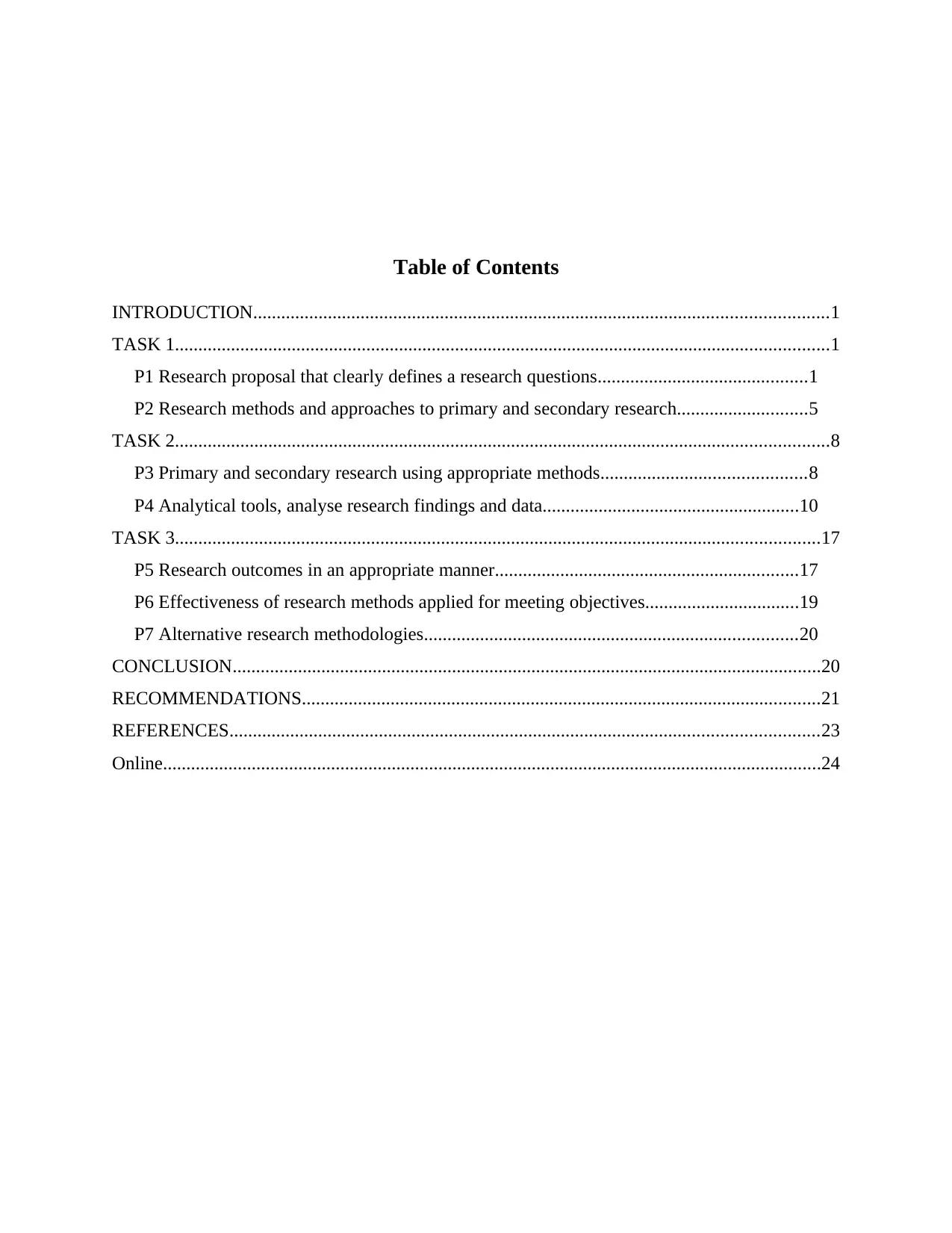
Table of Contents
INTRODUCTION...........................................................................................................................1
TASK 1............................................................................................................................................1
P1 Research proposal that clearly defines a research questions.............................................1
P2 Research methods and approaches to primary and secondary research............................5
TASK 2............................................................................................................................................8
P3 Primary and secondary research using appropriate methods............................................8
P4 Analytical tools, analyse research findings and data.......................................................10
TASK 3..........................................................................................................................................17
P5 Research outcomes in an appropriate manner.................................................................17
P6 Effectiveness of research methods applied for meeting objectives.................................19
P7 Alternative research methodologies................................................................................20
CONCLUSION..............................................................................................................................20
RECOMMENDATIONS...............................................................................................................21
REFERENCES..............................................................................................................................23
Online.............................................................................................................................................24
INTRODUCTION...........................................................................................................................1
TASK 1............................................................................................................................................1
P1 Research proposal that clearly defines a research questions.............................................1
P2 Research methods and approaches to primary and secondary research............................5
TASK 2............................................................................................................................................8
P3 Primary and secondary research using appropriate methods............................................8
P4 Analytical tools, analyse research findings and data.......................................................10
TASK 3..........................................................................................................................................17
P5 Research outcomes in an appropriate manner.................................................................17
P6 Effectiveness of research methods applied for meeting objectives.................................19
P7 Alternative research methodologies................................................................................20
CONCLUSION..............................................................................................................................20
RECOMMENDATIONS...............................................................................................................21
REFERENCES..............................................................................................................................23
Online.............................................................................................................................................24
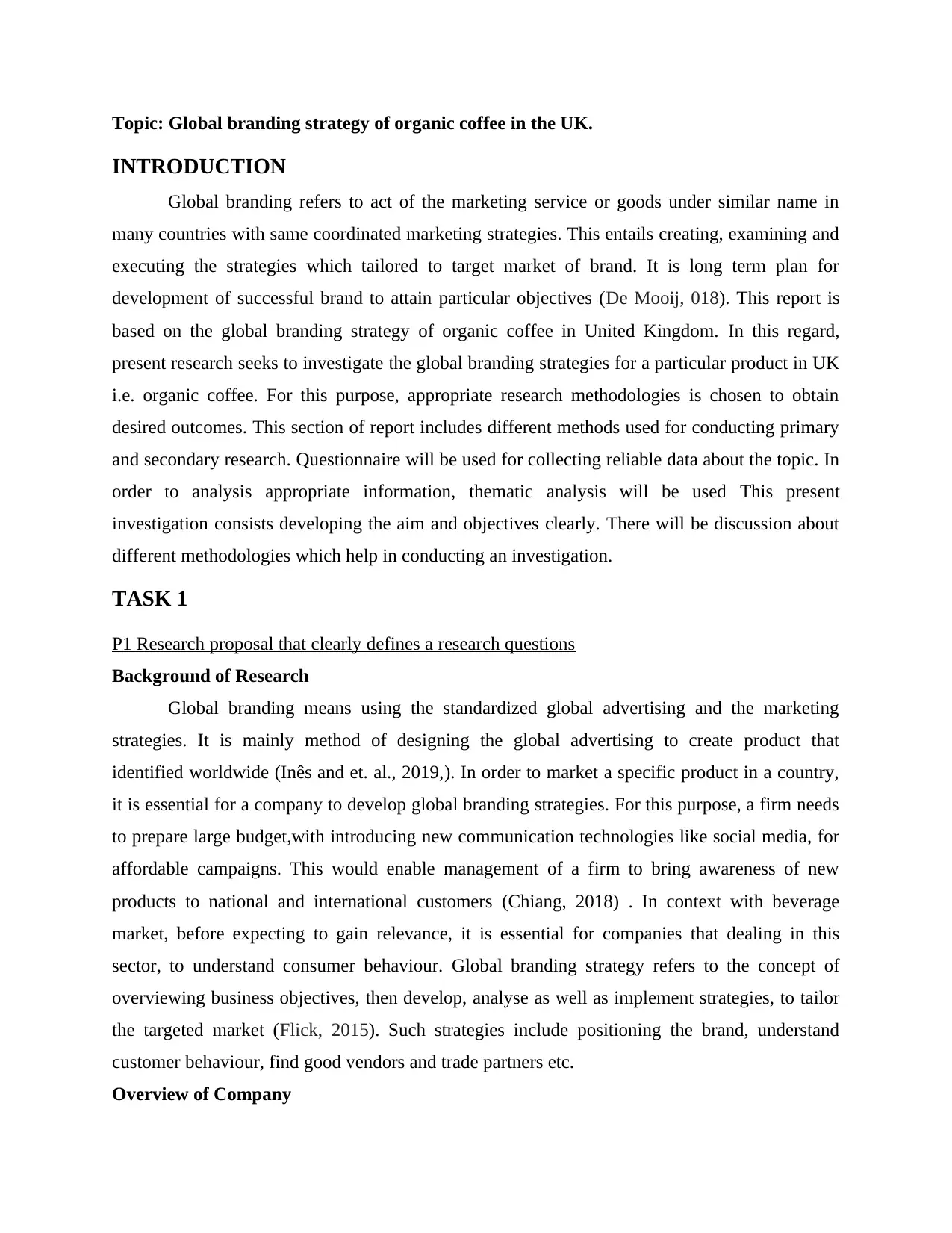
Topic: Global branding strategy of organic coffee in the UK.
INTRODUCTION
Global branding refers to act of the marketing service or goods under similar name in
many countries with same coordinated marketing strategies. This entails creating, examining and
executing the strategies which tailored to target market of brand. It is long term plan for
development of successful brand to attain particular objectives (De Mooij, 018). This report is
based on the global branding strategy of organic coffee in United Kingdom. In this regard,
present research seeks to investigate the global branding strategies for a particular product in UK
i.e. organic coffee. For this purpose, appropriate research methodologies is chosen to obtain
desired outcomes. This section of report includes different methods used for conducting primary
and secondary research. Questionnaire will be used for collecting reliable data about the topic. In
order to analysis appropriate information, thematic analysis will be used This present
investigation consists developing the aim and objectives clearly. There will be discussion about
different methodologies which help in conducting an investigation.
TASK 1
P1 Research proposal that clearly defines a research questions
Background of Research
Global branding means using the standardized global advertising and the marketing
strategies. It is mainly method of designing the global advertising to create product that
identified worldwide (Inês and et. al., 2019,). In order to market a specific product in a country,
it is essential for a company to develop global branding strategies. For this purpose, a firm needs
to prepare large budget,with introducing new communication technologies like social media, for
affordable campaigns. This would enable management of a firm to bring awareness of new
products to national and international customers (Chiang, 2018) . In context with beverage
market, before expecting to gain relevance, it is essential for companies that dealing in this
sector, to understand consumer behaviour. Global branding strategy refers to the concept of
overviewing business objectives, then develop, analyse as well as implement strategies, to tailor
the targeted market (Flick, 2015). Such strategies include positioning the brand, understand
customer behaviour, find good vendors and trade partners etc.
Overview of Company
INTRODUCTION
Global branding refers to act of the marketing service or goods under similar name in
many countries with same coordinated marketing strategies. This entails creating, examining and
executing the strategies which tailored to target market of brand. It is long term plan for
development of successful brand to attain particular objectives (De Mooij, 018). This report is
based on the global branding strategy of organic coffee in United Kingdom. In this regard,
present research seeks to investigate the global branding strategies for a particular product in UK
i.e. organic coffee. For this purpose, appropriate research methodologies is chosen to obtain
desired outcomes. This section of report includes different methods used for conducting primary
and secondary research. Questionnaire will be used for collecting reliable data about the topic. In
order to analysis appropriate information, thematic analysis will be used This present
investigation consists developing the aim and objectives clearly. There will be discussion about
different methodologies which help in conducting an investigation.
TASK 1
P1 Research proposal that clearly defines a research questions
Background of Research
Global branding means using the standardized global advertising and the marketing
strategies. It is mainly method of designing the global advertising to create product that
identified worldwide (Inês and et. al., 2019,). In order to market a specific product in a country,
it is essential for a company to develop global branding strategies. For this purpose, a firm needs
to prepare large budget,with introducing new communication technologies like social media, for
affordable campaigns. This would enable management of a firm to bring awareness of new
products to national and international customers (Chiang, 2018) . In context with beverage
market, before expecting to gain relevance, it is essential for companies that dealing in this
sector, to understand consumer behaviour. Global branding strategy refers to the concept of
overviewing business objectives, then develop, analyse as well as implement strategies, to tailor
the targeted market (Flick, 2015). Such strategies include positioning the brand, understand
customer behaviour, find good vendors and trade partners etc.
Overview of Company
⊘ This is a preview!⊘
Do you want full access?
Subscribe today to unlock all pages.

Trusted by 1+ million students worldwide
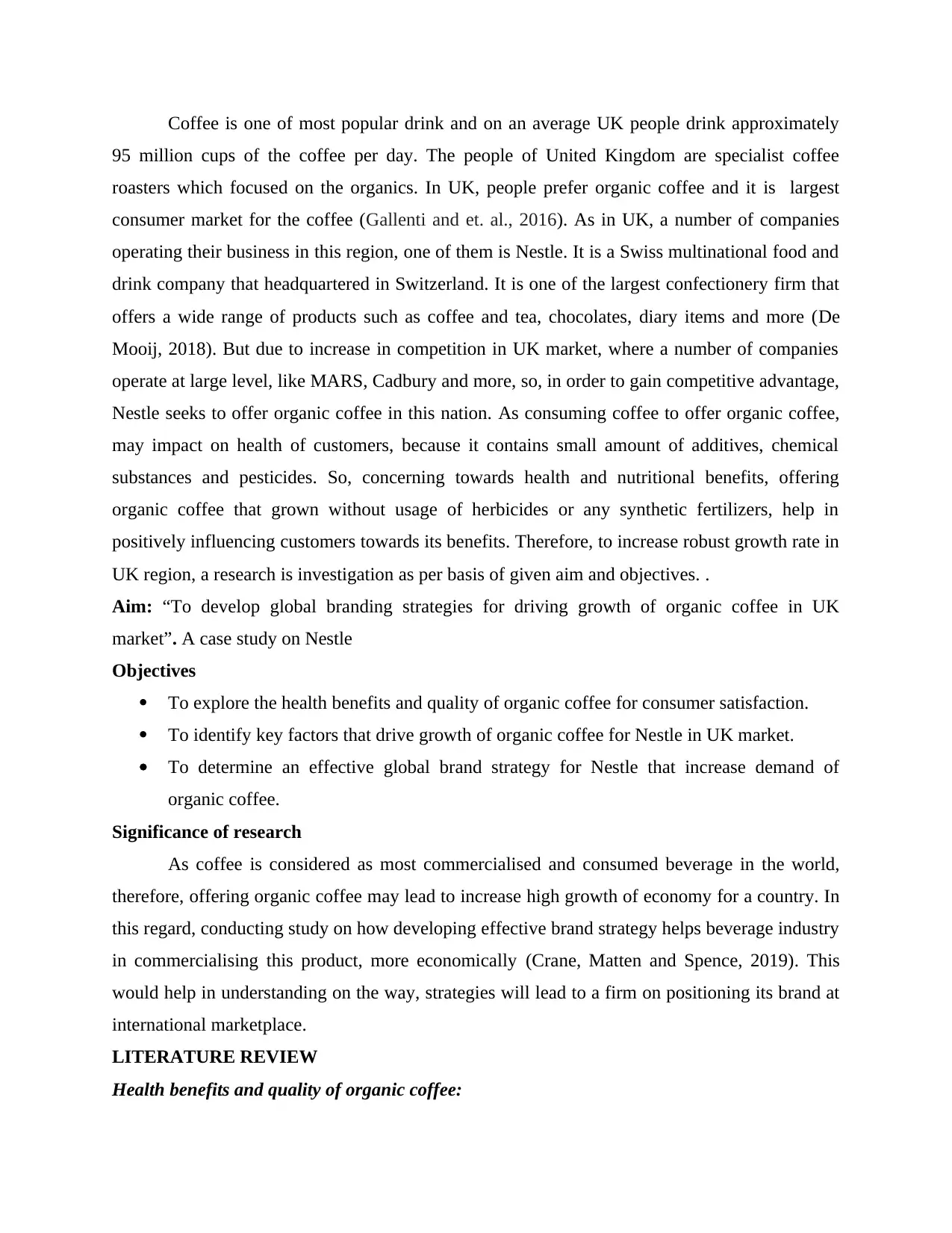
Coffee is one of most popular drink and on an average UK people drink approximately
95 million cups of the coffee per day. The people of United Kingdom are specialist coffee
roasters which focused on the organics. In UK, people prefer organic coffee and it is largest
consumer market for the coffee (Gallenti and et. al., 2016). As in UK, a number of companies
operating their business in this region, one of them is Nestle. It is a Swiss multinational food and
drink company that headquartered in Switzerland. It is one of the largest confectionery firm that
offers a wide range of products such as coffee and tea, chocolates, diary items and more (De
Mooij, 2018). But due to increase in competition in UK market, where a number of companies
operate at large level, like MARS, Cadbury and more, so, in order to gain competitive advantage,
Nestle seeks to offer organic coffee in this nation. As consuming coffee to offer organic coffee,
may impact on health of customers, because it contains small amount of additives, chemical
substances and pesticides. So, concerning towards health and nutritional benefits, offering
organic coffee that grown without usage of herbicides or any synthetic fertilizers, help in
positively influencing customers towards its benefits. Therefore, to increase robust growth rate in
UK region, a research is investigation as per basis of given aim and objectives. .
Aim: “To develop global branding strategies for driving growth of organic coffee in UK
market”. A case study on Nestle
Objectives
To explore the health benefits and quality of organic coffee for consumer satisfaction.
To identify key factors that drive growth of organic coffee for Nestle in UK market.
To determine an effective global brand strategy for Nestle that increase demand of
organic coffee.
Significance of research
As coffee is considered as most commercialised and consumed beverage in the world,
therefore, offering organic coffee may lead to increase high growth of economy for a country. In
this regard, conducting study on how developing effective brand strategy helps beverage industry
in commercialising this product, more economically (Crane, Matten and Spence, 2019). This
would help in understanding on the way, strategies will lead to a firm on positioning its brand at
international marketplace.
LITERATURE REVIEW
Health benefits and quality of organic coffee:
95 million cups of the coffee per day. The people of United Kingdom are specialist coffee
roasters which focused on the organics. In UK, people prefer organic coffee and it is largest
consumer market for the coffee (Gallenti and et. al., 2016). As in UK, a number of companies
operating their business in this region, one of them is Nestle. It is a Swiss multinational food and
drink company that headquartered in Switzerland. It is one of the largest confectionery firm that
offers a wide range of products such as coffee and tea, chocolates, diary items and more (De
Mooij, 2018). But due to increase in competition in UK market, where a number of companies
operate at large level, like MARS, Cadbury and more, so, in order to gain competitive advantage,
Nestle seeks to offer organic coffee in this nation. As consuming coffee to offer organic coffee,
may impact on health of customers, because it contains small amount of additives, chemical
substances and pesticides. So, concerning towards health and nutritional benefits, offering
organic coffee that grown without usage of herbicides or any synthetic fertilizers, help in
positively influencing customers towards its benefits. Therefore, to increase robust growth rate in
UK region, a research is investigation as per basis of given aim and objectives. .
Aim: “To develop global branding strategies for driving growth of organic coffee in UK
market”. A case study on Nestle
Objectives
To explore the health benefits and quality of organic coffee for consumer satisfaction.
To identify key factors that drive growth of organic coffee for Nestle in UK market.
To determine an effective global brand strategy for Nestle that increase demand of
organic coffee.
Significance of research
As coffee is considered as most commercialised and consumed beverage in the world,
therefore, offering organic coffee may lead to increase high growth of economy for a country. In
this regard, conducting study on how developing effective brand strategy helps beverage industry
in commercialising this product, more economically (Crane, Matten and Spence, 2019). This
would help in understanding on the way, strategies will lead to a firm on positioning its brand at
international marketplace.
LITERATURE REVIEW
Health benefits and quality of organic coffee:
Paraphrase This Document
Need a fresh take? Get an instant paraphrase of this document with our AI Paraphraser
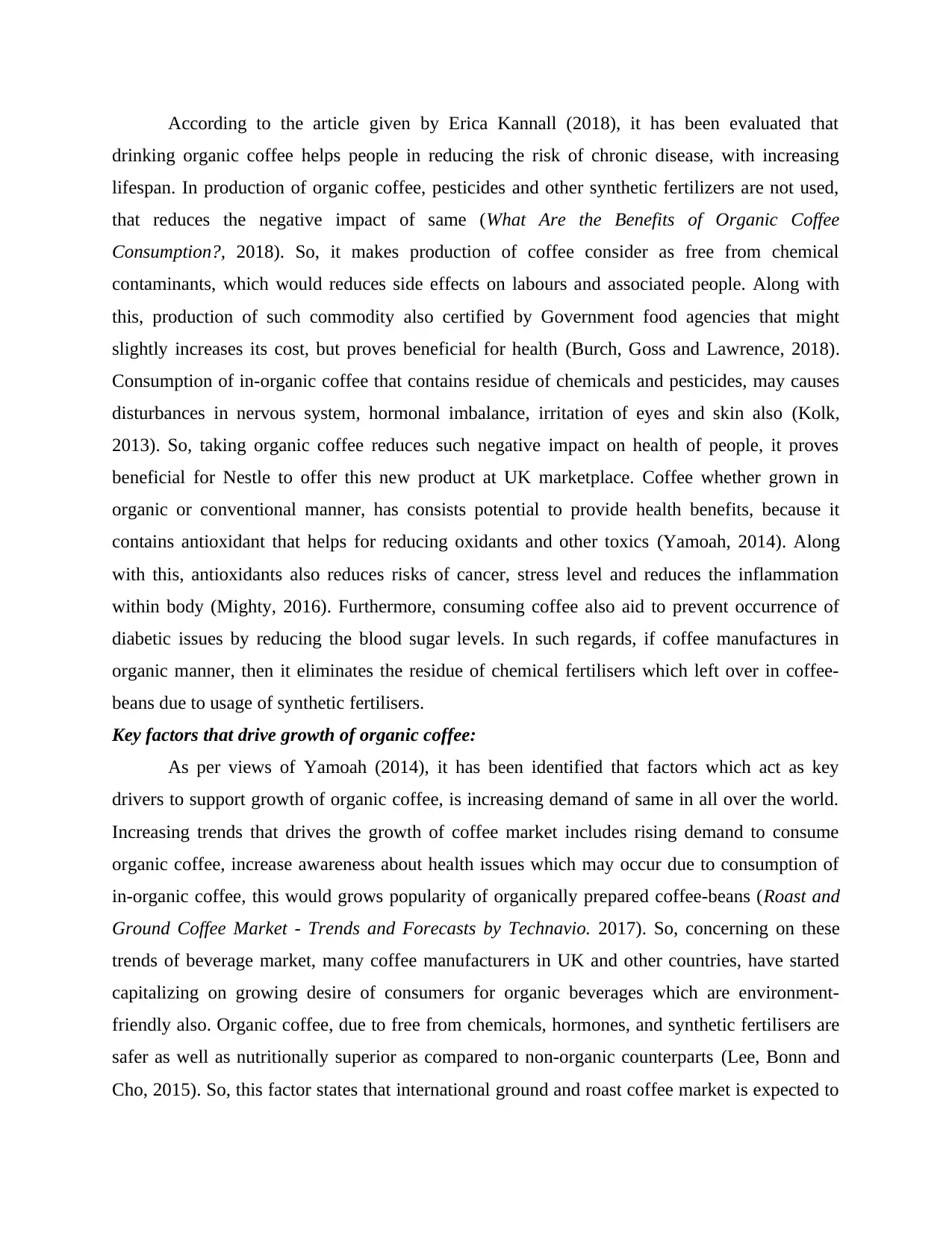
According to the article given by Erica Kannall (2018), it has been evaluated that
drinking organic coffee helps people in reducing the risk of chronic disease, with increasing
lifespan. In production of organic coffee, pesticides and other synthetic fertilizers are not used,
that reduces the negative impact of same (What Are the Benefits of Organic Coffee
Consumption?, 2018). So, it makes production of coffee consider as free from chemical
contaminants, which would reduces side effects on labours and associated people. Along with
this, production of such commodity also certified by Government food agencies that might
slightly increases its cost, but proves beneficial for health (Burch, Goss and Lawrence, 2018).
Consumption of in-organic coffee that contains residue of chemicals and pesticides, may causes
disturbances in nervous system, hormonal imbalance, irritation of eyes and skin also (Kolk,
2013). So, taking organic coffee reduces such negative impact on health of people, it proves
beneficial for Nestle to offer this new product at UK marketplace. Coffee whether grown in
organic or conventional manner, has consists potential to provide health benefits, because it
contains antioxidant that helps for reducing oxidants and other toxics (Yamoah, 2014). Along
with this, antioxidants also reduces risks of cancer, stress level and reduces the inflammation
within body (Mighty, 2016). Furthermore, consuming coffee also aid to prevent occurrence of
diabetic issues by reducing the blood sugar levels. In such regards, if coffee manufactures in
organic manner, then it eliminates the residue of chemical fertilisers which left over in coffee-
beans due to usage of synthetic fertilisers.
Key factors that drive growth of organic coffee:
As per views of Yamoah (2014), it has been identified that factors which act as key
drivers to support growth of organic coffee, is increasing demand of same in all over the world.
Increasing trends that drives the growth of coffee market includes rising demand to consume
organic coffee, increase awareness about health issues which may occur due to consumption of
in-organic coffee, this would grows popularity of organically prepared coffee-beans (Roast and
Ground Coffee Market - Trends and Forecasts by Technavio. 2017). So, concerning on these
trends of beverage market, many coffee manufacturers in UK and other countries, have started
capitalizing on growing desire of consumers for organic beverages which are environment-
friendly also. Organic coffee, due to free from chemicals, hormones, and synthetic fertilisers are
safer as well as nutritionally superior as compared to non-organic counterparts (Lee, Bonn and
Cho, 2015). So, this factor states that international ground and roast coffee market is expected to
drinking organic coffee helps people in reducing the risk of chronic disease, with increasing
lifespan. In production of organic coffee, pesticides and other synthetic fertilizers are not used,
that reduces the negative impact of same (What Are the Benefits of Organic Coffee
Consumption?, 2018). So, it makes production of coffee consider as free from chemical
contaminants, which would reduces side effects on labours and associated people. Along with
this, production of such commodity also certified by Government food agencies that might
slightly increases its cost, but proves beneficial for health (Burch, Goss and Lawrence, 2018).
Consumption of in-organic coffee that contains residue of chemicals and pesticides, may causes
disturbances in nervous system, hormonal imbalance, irritation of eyes and skin also (Kolk,
2013). So, taking organic coffee reduces such negative impact on health of people, it proves
beneficial for Nestle to offer this new product at UK marketplace. Coffee whether grown in
organic or conventional manner, has consists potential to provide health benefits, because it
contains antioxidant that helps for reducing oxidants and other toxics (Yamoah, 2014). Along
with this, antioxidants also reduces risks of cancer, stress level and reduces the inflammation
within body (Mighty, 2016). Furthermore, consuming coffee also aid to prevent occurrence of
diabetic issues by reducing the blood sugar levels. In such regards, if coffee manufactures in
organic manner, then it eliminates the residue of chemical fertilisers which left over in coffee-
beans due to usage of synthetic fertilisers.
Key factors that drive growth of organic coffee:
As per views of Yamoah (2014), it has been identified that factors which act as key
drivers to support growth of organic coffee, is increasing demand of same in all over the world.
Increasing trends that drives the growth of coffee market includes rising demand to consume
organic coffee, increase awareness about health issues which may occur due to consumption of
in-organic coffee, this would grows popularity of organically prepared coffee-beans (Roast and
Ground Coffee Market - Trends and Forecasts by Technavio. 2017). So, concerning on these
trends of beverage market, many coffee manufacturers in UK and other countries, have started
capitalizing on growing desire of consumers for organic beverages which are environment-
friendly also. Organic coffee, due to free from chemicals, hormones, and synthetic fertilisers are
safer as well as nutritionally superior as compared to non-organic counterparts (Lee, Bonn and
Cho, 2015). So, this factor states that international ground and roast coffee market is expected to
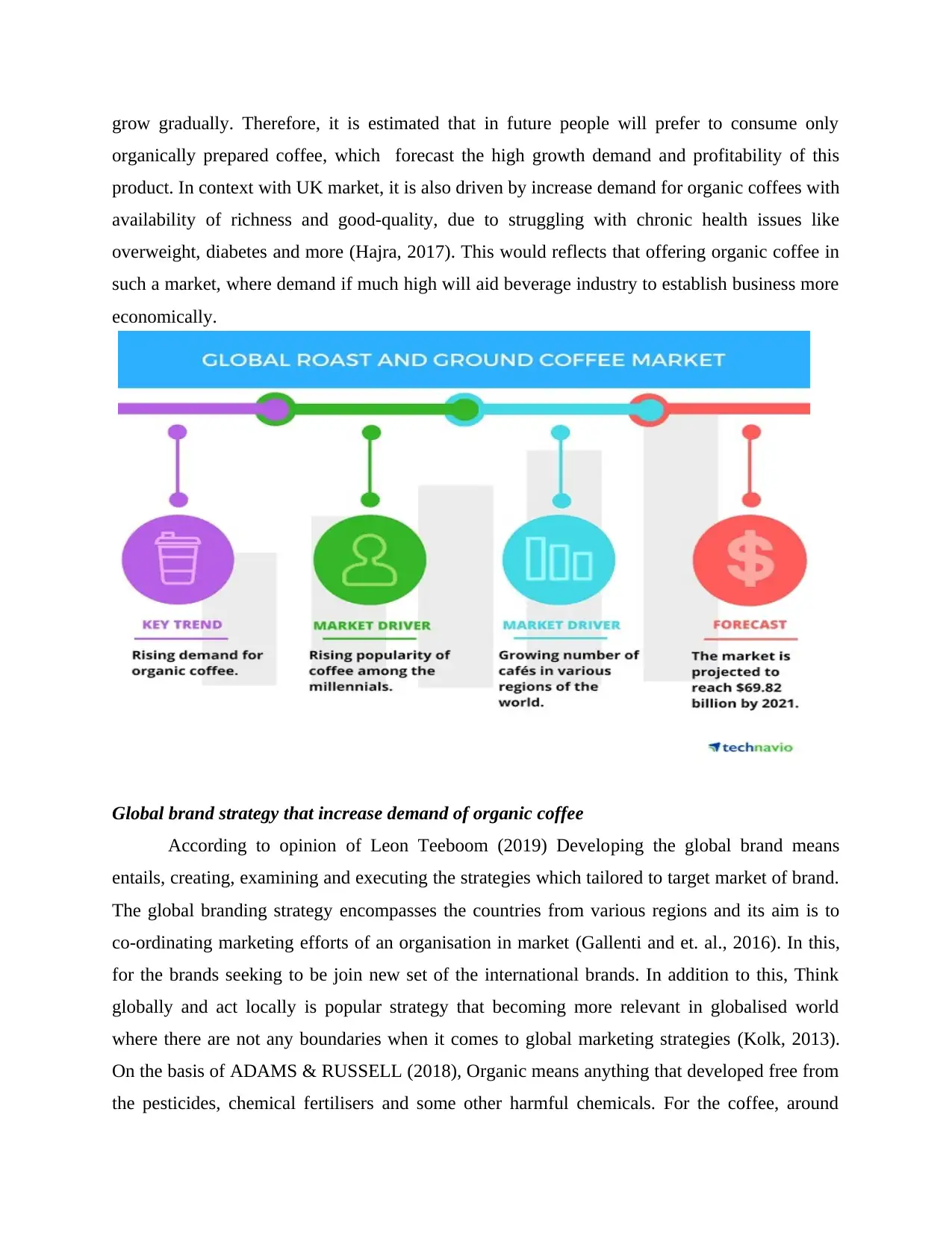
grow gradually. Therefore, it is estimated that in future people will prefer to consume only
organically prepared coffee, which forecast the high growth demand and profitability of this
product. In context with UK market, it is also driven by increase demand for organic coffees with
availability of richness and good-quality, due to struggling with chronic health issues like
overweight, diabetes and more (Hajra, 2017). This would reflects that offering organic coffee in
such a market, where demand if much high will aid beverage industry to establish business more
economically.
Global brand strategy that increase demand of organic coffee
According to opinion of Leon Teeboom (2019) Developing the global brand means
entails, creating, examining and executing the strategies which tailored to target market of brand.
The global branding strategy encompasses the countries from various regions and its aim is to
co-ordinating marketing efforts of an organisation in market (Gallenti and et. al., 2016). In this,
for the brands seeking to be join new set of the international brands. In addition to this, Think
globally and act locally is popular strategy that becoming more relevant in globalised world
where there are not any boundaries when it comes to global marketing strategies (Kolk, 2013).
On the basis of ADAMS & RUSSELL (2018), Organic means anything that developed free from
the pesticides, chemical fertilisers and some other harmful chemicals. For the coffee, around
organically prepared coffee, which forecast the high growth demand and profitability of this
product. In context with UK market, it is also driven by increase demand for organic coffees with
availability of richness and good-quality, due to struggling with chronic health issues like
overweight, diabetes and more (Hajra, 2017). This would reflects that offering organic coffee in
such a market, where demand if much high will aid beverage industry to establish business more
economically.
Global brand strategy that increase demand of organic coffee
According to opinion of Leon Teeboom (2019) Developing the global brand means
entails, creating, examining and executing the strategies which tailored to target market of brand.
The global branding strategy encompasses the countries from various regions and its aim is to
co-ordinating marketing efforts of an organisation in market (Gallenti and et. al., 2016). In this,
for the brands seeking to be join new set of the international brands. In addition to this, Think
globally and act locally is popular strategy that becoming more relevant in globalised world
where there are not any boundaries when it comes to global marketing strategies (Kolk, 2013).
On the basis of ADAMS & RUSSELL (2018), Organic means anything that developed free from
the pesticides, chemical fertilisers and some other harmful chemicals. For the coffee, around
⊘ This is a preview!⊘
Do you want full access?
Subscribe today to unlock all pages.

Trusted by 1+ million students worldwide
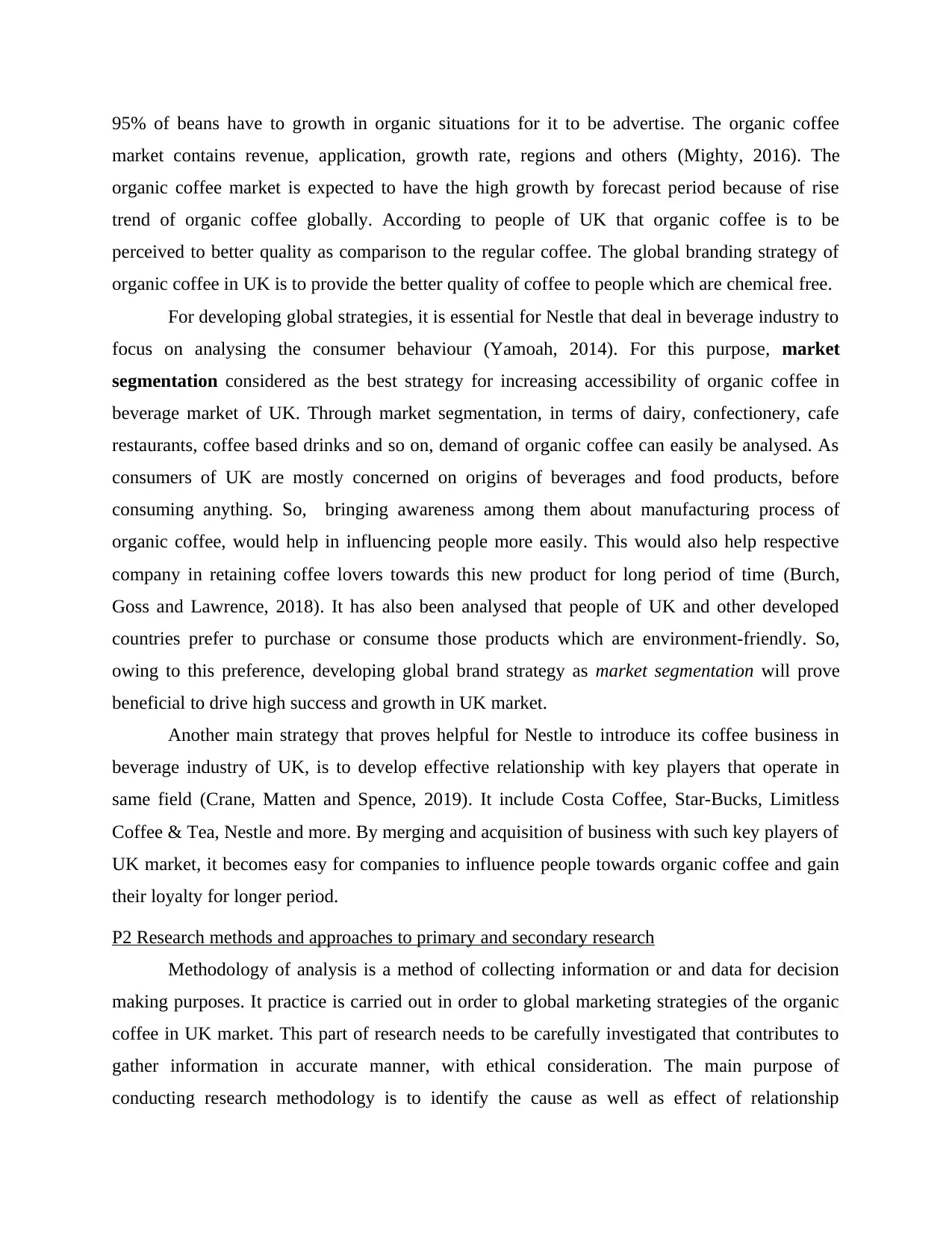
95% of beans have to growth in organic situations for it to be advertise. The organic coffee
market contains revenue, application, growth rate, regions and others (Mighty, 2016). The
organic coffee market is expected to have the high growth by forecast period because of rise
trend of organic coffee globally. According to people of UK that organic coffee is to be
perceived to better quality as comparison to the regular coffee. The global branding strategy of
organic coffee in UK is to provide the better quality of coffee to people which are chemical free.
For developing global strategies, it is essential for Nestle that deal in beverage industry to
focus on analysing the consumer behaviour (Yamoah, 2014). For this purpose, market
segmentation considered as the best strategy for increasing accessibility of organic coffee in
beverage market of UK. Through market segmentation, in terms of dairy, confectionery, cafe
restaurants, coffee based drinks and so on, demand of organic coffee can easily be analysed. As
consumers of UK are mostly concerned on origins of beverages and food products, before
consuming anything. So, bringing awareness among them about manufacturing process of
organic coffee, would help in influencing people more easily. This would also help respective
company in retaining coffee lovers towards this new product for long period of time (Burch,
Goss and Lawrence, 2018). It has also been analysed that people of UK and other developed
countries prefer to purchase or consume those products which are environment-friendly. So,
owing to this preference, developing global brand strategy as market segmentation will prove
beneficial to drive high success and growth in UK market.
Another main strategy that proves helpful for Nestle to introduce its coffee business in
beverage industry of UK, is to develop effective relationship with key players that operate in
same field (Crane, Matten and Spence, 2019). It include Costa Coffee, Star-Bucks, Limitless
Coffee & Tea, Nestle and more. By merging and acquisition of business with such key players of
UK market, it becomes easy for companies to influence people towards organic coffee and gain
their loyalty for longer period.
P2 Research methods and approaches to primary and secondary research
Methodology of analysis is a method of collecting information or and data for decision
making purposes. It practice is carried out in order to global marketing strategies of the organic
coffee in UK market. This part of research needs to be carefully investigated that contributes to
gather information in accurate manner, with ethical consideration. The main purpose of
conducting research methodology is to identify the cause as well as effect of relationship
market contains revenue, application, growth rate, regions and others (Mighty, 2016). The
organic coffee market is expected to have the high growth by forecast period because of rise
trend of organic coffee globally. According to people of UK that organic coffee is to be
perceived to better quality as comparison to the regular coffee. The global branding strategy of
organic coffee in UK is to provide the better quality of coffee to people which are chemical free.
For developing global strategies, it is essential for Nestle that deal in beverage industry to
focus on analysing the consumer behaviour (Yamoah, 2014). For this purpose, market
segmentation considered as the best strategy for increasing accessibility of organic coffee in
beverage market of UK. Through market segmentation, in terms of dairy, confectionery, cafe
restaurants, coffee based drinks and so on, demand of organic coffee can easily be analysed. As
consumers of UK are mostly concerned on origins of beverages and food products, before
consuming anything. So, bringing awareness among them about manufacturing process of
organic coffee, would help in influencing people more easily. This would also help respective
company in retaining coffee lovers towards this new product for long period of time (Burch,
Goss and Lawrence, 2018). It has also been analysed that people of UK and other developed
countries prefer to purchase or consume those products which are environment-friendly. So,
owing to this preference, developing global brand strategy as market segmentation will prove
beneficial to drive high success and growth in UK market.
Another main strategy that proves helpful for Nestle to introduce its coffee business in
beverage industry of UK, is to develop effective relationship with key players that operate in
same field (Crane, Matten and Spence, 2019). It include Costa Coffee, Star-Bucks, Limitless
Coffee & Tea, Nestle and more. By merging and acquisition of business with such key players of
UK market, it becomes easy for companies to influence people towards organic coffee and gain
their loyalty for longer period.
P2 Research methods and approaches to primary and secondary research
Methodology of analysis is a method of collecting information or and data for decision
making purposes. It practice is carried out in order to global marketing strategies of the organic
coffee in UK market. This part of research needs to be carefully investigated that contributes to
gather information in accurate manner, with ethical consideration. The main purpose of
conducting research methodology is to identify the cause as well as effect of relationship
Paraphrase This Document
Need a fresh take? Get an instant paraphrase of this document with our AI Paraphraser
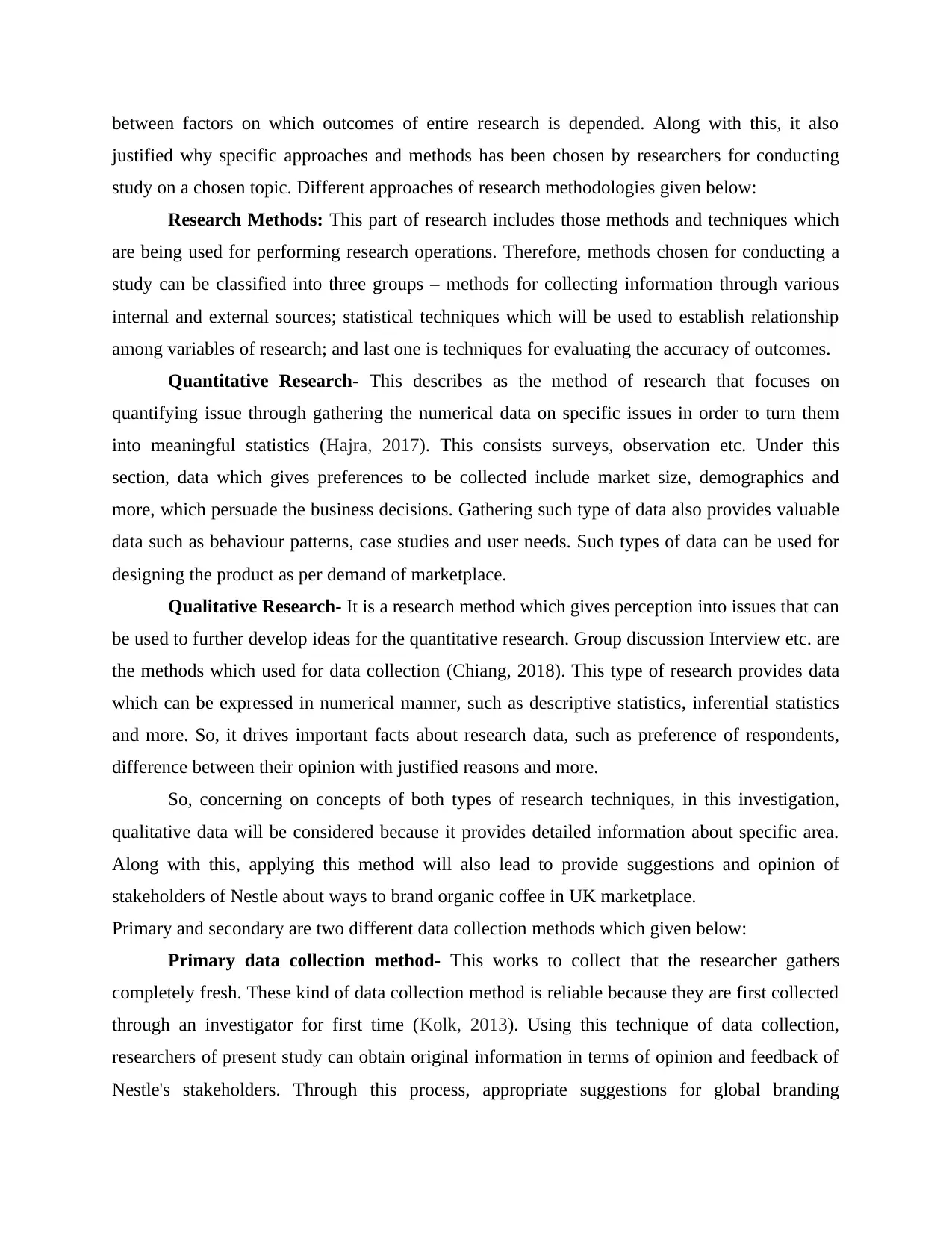
between factors on which outcomes of entire research is depended. Along with this, it also
justified why specific approaches and methods has been chosen by researchers for conducting
study on a chosen topic. Different approaches of research methodologies given below:
Research Methods: This part of research includes those methods and techniques which
are being used for performing research operations. Therefore, methods chosen for conducting a
study can be classified into three groups – methods for collecting information through various
internal and external sources; statistical techniques which will be used to establish relationship
among variables of research; and last one is techniques for evaluating the accuracy of outcomes.
Quantitative Research- This describes as the method of research that focuses on
quantifying issue through gathering the numerical data on specific issues in order to turn them
into meaningful statistics (Hajra, 2017). This consists surveys, observation etc. Under this
section, data which gives preferences to be collected include market size, demographics and
more, which persuade the business decisions. Gathering such type of data also provides valuable
data such as behaviour patterns, case studies and user needs. Such types of data can be used for
designing the product as per demand of marketplace.
Qualitative Research- It is a research method which gives perception into issues that can
be used to further develop ideas for the quantitative research. Group discussion Interview etc. are
the methods which used for data collection (Chiang, 2018). This type of research provides data
which can be expressed in numerical manner, such as descriptive statistics, inferential statistics
and more. So, it drives important facts about research data, such as preference of respondents,
difference between their opinion with justified reasons and more.
So, concerning on concepts of both types of research techniques, in this investigation,
qualitative data will be considered because it provides detailed information about specific area.
Along with this, applying this method will also lead to provide suggestions and opinion of
stakeholders of Nestle about ways to brand organic coffee in UK marketplace.
Primary and secondary are two different data collection methods which given below:
Primary data collection method- This works to collect that the researcher gathers
completely fresh. These kind of data collection method is reliable because they are first collected
through an investigator for first time (Kolk, 2013). Using this technique of data collection,
researchers of present study can obtain original information in terms of opinion and feedback of
Nestle's stakeholders. Through this process, appropriate suggestions for global branding
justified why specific approaches and methods has been chosen by researchers for conducting
study on a chosen topic. Different approaches of research methodologies given below:
Research Methods: This part of research includes those methods and techniques which
are being used for performing research operations. Therefore, methods chosen for conducting a
study can be classified into three groups – methods for collecting information through various
internal and external sources; statistical techniques which will be used to establish relationship
among variables of research; and last one is techniques for evaluating the accuracy of outcomes.
Quantitative Research- This describes as the method of research that focuses on
quantifying issue through gathering the numerical data on specific issues in order to turn them
into meaningful statistics (Hajra, 2017). This consists surveys, observation etc. Under this
section, data which gives preferences to be collected include market size, demographics and
more, which persuade the business decisions. Gathering such type of data also provides valuable
data such as behaviour patterns, case studies and user needs. Such types of data can be used for
designing the product as per demand of marketplace.
Qualitative Research- It is a research method which gives perception into issues that can
be used to further develop ideas for the quantitative research. Group discussion Interview etc. are
the methods which used for data collection (Chiang, 2018). This type of research provides data
which can be expressed in numerical manner, such as descriptive statistics, inferential statistics
and more. So, it drives important facts about research data, such as preference of respondents,
difference between their opinion with justified reasons and more.
So, concerning on concepts of both types of research techniques, in this investigation,
qualitative data will be considered because it provides detailed information about specific area.
Along with this, applying this method will also lead to provide suggestions and opinion of
stakeholders of Nestle about ways to brand organic coffee in UK marketplace.
Primary and secondary are two different data collection methods which given below:
Primary data collection method- This works to collect that the researcher gathers
completely fresh. These kind of data collection method is reliable because they are first collected
through an investigator for first time (Kolk, 2013). Using this technique of data collection,
researchers of present study can obtain original information in terms of opinion and feedback of
Nestle's stakeholders. Through this process, appropriate suggestions for global branding
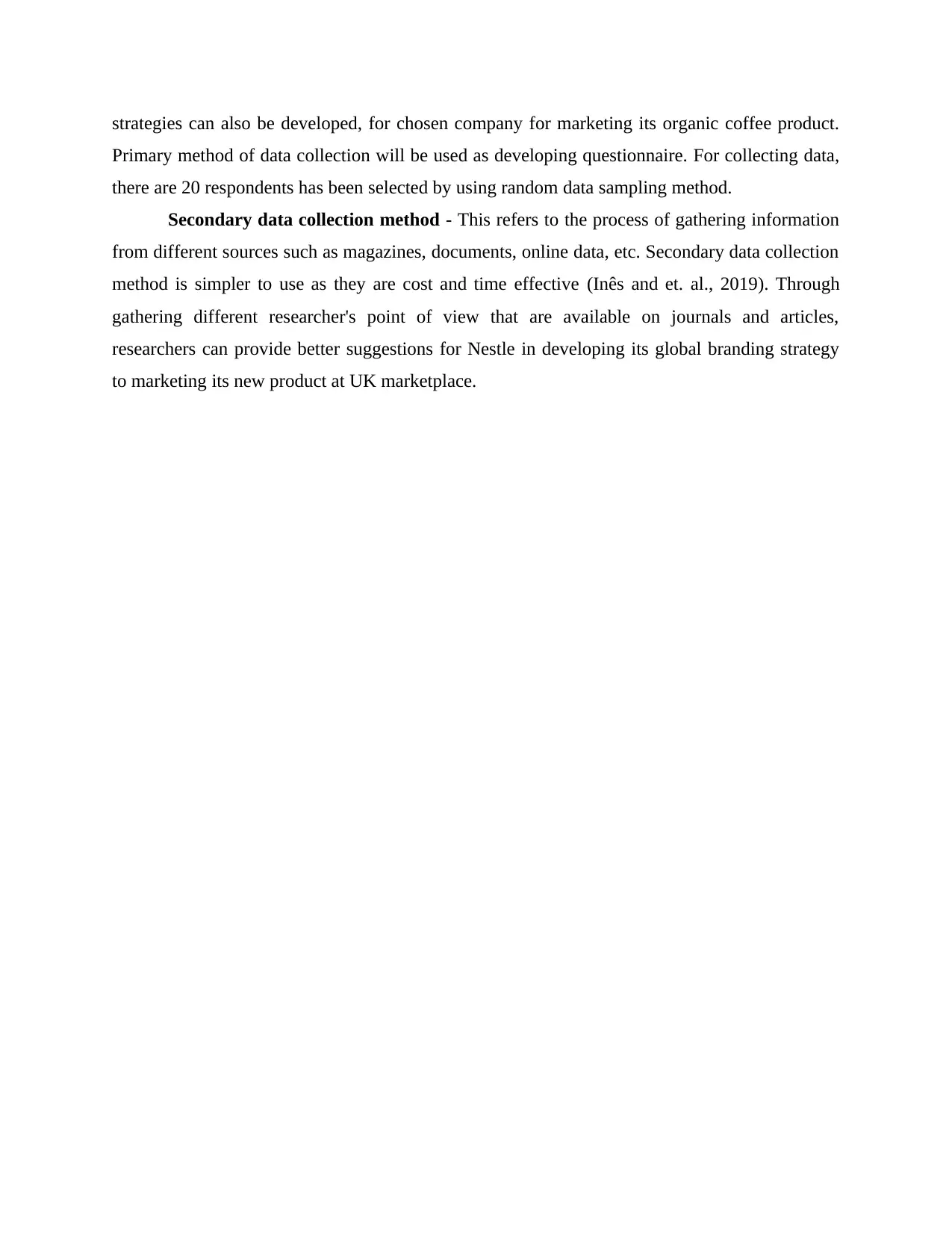
strategies can also be developed, for chosen company for marketing its organic coffee product.
Primary method of data collection will be used as developing questionnaire. For collecting data,
there are 20 respondents has been selected by using random data sampling method.
Secondary data collection method - This refers to the process of gathering information
from different sources such as magazines, documents, online data, etc. Secondary data collection
method is simpler to use as they are cost and time effective (Inês and et. al., 2019). Through
gathering different researcher's point of view that are available on journals and articles,
researchers can provide better suggestions for Nestle in developing its global branding strategy
to marketing its new product at UK marketplace.
Primary method of data collection will be used as developing questionnaire. For collecting data,
there are 20 respondents has been selected by using random data sampling method.
Secondary data collection method - This refers to the process of gathering information
from different sources such as magazines, documents, online data, etc. Secondary data collection
method is simpler to use as they are cost and time effective (Inês and et. al., 2019). Through
gathering different researcher's point of view that are available on journals and articles,
researchers can provide better suggestions for Nestle in developing its global branding strategy
to marketing its new product at UK marketplace.
⊘ This is a preview!⊘
Do you want full access?
Subscribe today to unlock all pages.

Trusted by 1+ million students worldwide
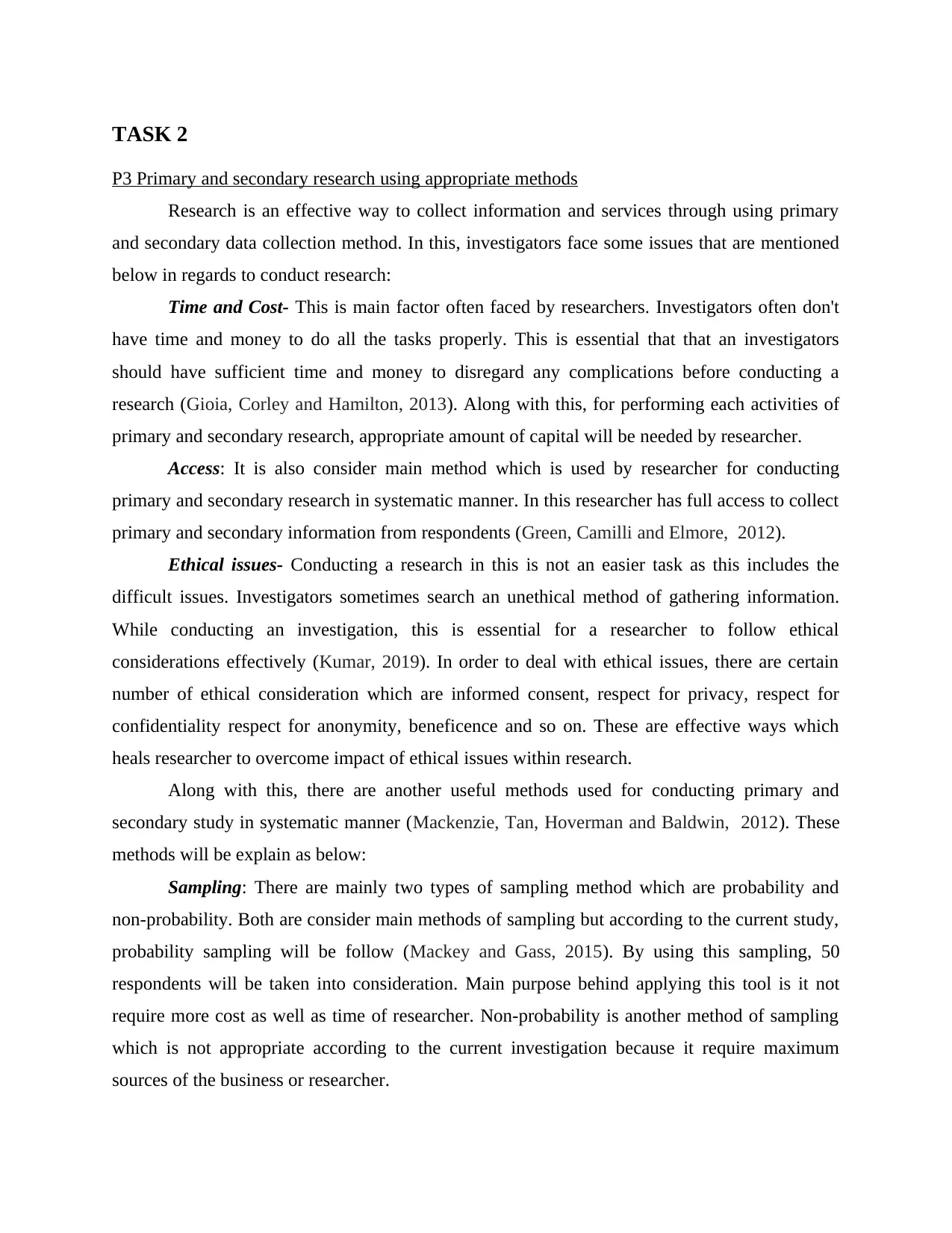
TASK 2
P3 Primary and secondary research using appropriate methods
Research is an effective way to collect information and services through using primary
and secondary data collection method. In this, investigators face some issues that are mentioned
below in regards to conduct research:
Time and Cost- This is main factor often faced by researchers. Investigators often don't
have time and money to do all the tasks properly. This is essential that that an investigators
should have sufficient time and money to disregard any complications before conducting a
research (Gioia, Corley and Hamilton, 2013). Along with this, for performing each activities of
primary and secondary research, appropriate amount of capital will be needed by researcher.
Access: It is also consider main method which is used by researcher for conducting
primary and secondary research in systematic manner. In this researcher has full access to collect
primary and secondary information from respondents (Green, Camilli and Elmore, 2012).
Ethical issues- Conducting a research in this is not an easier task as this includes the
difficult issues. Investigators sometimes search an unethical method of gathering information.
While conducting an investigation, this is essential for a researcher to follow ethical
considerations effectively (Kumar, 2019). In order to deal with ethical issues, there are certain
number of ethical consideration which are informed consent, respect for privacy, respect for
confidentiality respect for anonymity, beneficence and so on. These are effective ways which
heals researcher to overcome impact of ethical issues within research.
Along with this, there are another useful methods used for conducting primary and
secondary study in systematic manner (Mackenzie, Tan, Hoverman and Baldwin, 2012). These
methods will be explain as below:
Sampling: There are mainly two types of sampling method which are probability and
non-probability. Both are consider main methods of sampling but according to the current study,
probability sampling will be follow (Mackey and Gass, 2015). By using this sampling, 50
respondents will be taken into consideration. Main purpose behind applying this tool is it not
require more cost as well as time of researcher. Non-probability is another method of sampling
which is not appropriate according to the current investigation because it require maximum
sources of the business or researcher.
P3 Primary and secondary research using appropriate methods
Research is an effective way to collect information and services through using primary
and secondary data collection method. In this, investigators face some issues that are mentioned
below in regards to conduct research:
Time and Cost- This is main factor often faced by researchers. Investigators often don't
have time and money to do all the tasks properly. This is essential that that an investigators
should have sufficient time and money to disregard any complications before conducting a
research (Gioia, Corley and Hamilton, 2013). Along with this, for performing each activities of
primary and secondary research, appropriate amount of capital will be needed by researcher.
Access: It is also consider main method which is used by researcher for conducting
primary and secondary research in systematic manner. In this researcher has full access to collect
primary and secondary information from respondents (Green, Camilli and Elmore, 2012).
Ethical issues- Conducting a research in this is not an easier task as this includes the
difficult issues. Investigators sometimes search an unethical method of gathering information.
While conducting an investigation, this is essential for a researcher to follow ethical
considerations effectively (Kumar, 2019). In order to deal with ethical issues, there are certain
number of ethical consideration which are informed consent, respect for privacy, respect for
confidentiality respect for anonymity, beneficence and so on. These are effective ways which
heals researcher to overcome impact of ethical issues within research.
Along with this, there are another useful methods used for conducting primary and
secondary study in systematic manner (Mackenzie, Tan, Hoverman and Baldwin, 2012). These
methods will be explain as below:
Sampling: There are mainly two types of sampling method which are probability and
non-probability. Both are consider main methods of sampling but according to the current study,
probability sampling will be follow (Mackey and Gass, 2015). By using this sampling, 50
respondents will be taken into consideration. Main purpose behind applying this tool is it not
require more cost as well as time of researcher. Non-probability is another method of sampling
which is not appropriate according to the current investigation because it require maximum
sources of the business or researcher.
Paraphrase This Document
Need a fresh take? Get an instant paraphrase of this document with our AI Paraphraser
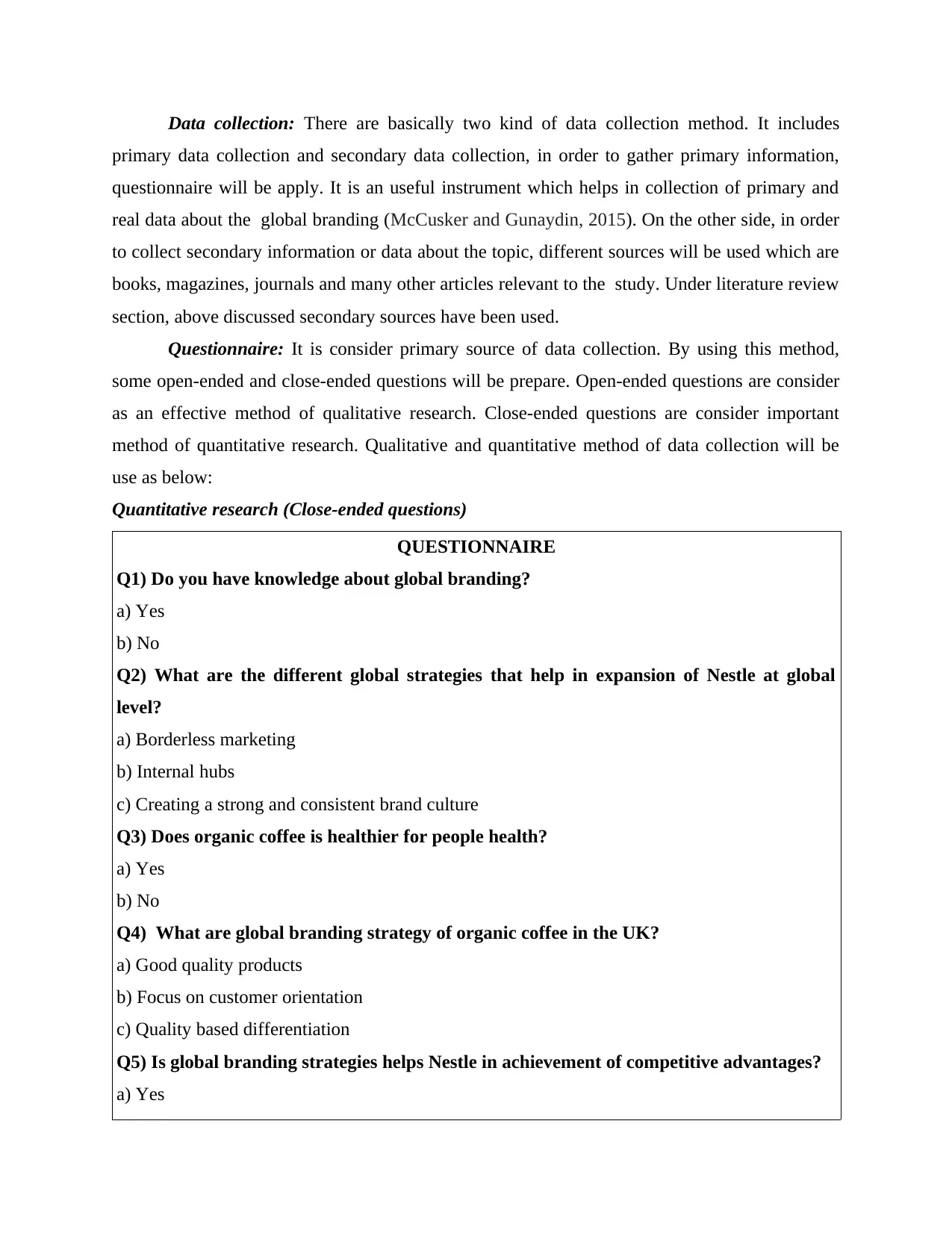
Data collection: There are basically two kind of data collection method. It includes
primary data collection and secondary data collection, in order to gather primary information,
questionnaire will be apply. It is an useful instrument which helps in collection of primary and
real data about the global branding (McCusker and Gunaydin, 2015). On the other side, in order
to collect secondary information or data about the topic, different sources will be used which are
books, magazines, journals and many other articles relevant to the study. Under literature review
section, above discussed secondary sources have been used.
Questionnaire: It is consider primary source of data collection. By using this method,
some open-ended and close-ended questions will be prepare. Open-ended questions are consider
as an effective method of qualitative research. Close-ended questions are consider important
method of quantitative research. Qualitative and quantitative method of data collection will be
use as below:
Quantitative research (Close-ended questions)
QUESTIONNAIRE
Q1) Do you have knowledge about global branding?
a) Yes
b) No
Q2) What are the different global strategies that help in expansion of Nestle at global
level?
a) Borderless marketing
b) Internal hubs
c) Creating a strong and consistent brand culture
Q3) Does organic coffee is healthier for people health?
a) Yes
b) No
Q4) What are global branding strategy of organic coffee in the UK?
a) Good quality products
b) Focus on customer orientation
c) Quality based differentiation
Q5) Is global branding strategies helps Nestle in achievement of competitive advantages?
a) Yes
primary data collection and secondary data collection, in order to gather primary information,
questionnaire will be apply. It is an useful instrument which helps in collection of primary and
real data about the global branding (McCusker and Gunaydin, 2015). On the other side, in order
to collect secondary information or data about the topic, different sources will be used which are
books, magazines, journals and many other articles relevant to the study. Under literature review
section, above discussed secondary sources have been used.
Questionnaire: It is consider primary source of data collection. By using this method,
some open-ended and close-ended questions will be prepare. Open-ended questions are consider
as an effective method of qualitative research. Close-ended questions are consider important
method of quantitative research. Qualitative and quantitative method of data collection will be
use as below:
Quantitative research (Close-ended questions)
QUESTIONNAIRE
Q1) Do you have knowledge about global branding?
a) Yes
b) No
Q2) What are the different global strategies that help in expansion of Nestle at global
level?
a) Borderless marketing
b) Internal hubs
c) Creating a strong and consistent brand culture
Q3) Does organic coffee is healthier for people health?
a) Yes
b) No
Q4) What are global branding strategy of organic coffee in the UK?
a) Good quality products
b) Focus on customer orientation
c) Quality based differentiation
Q5) Is global branding strategies helps Nestle in achievement of competitive advantages?
a) Yes
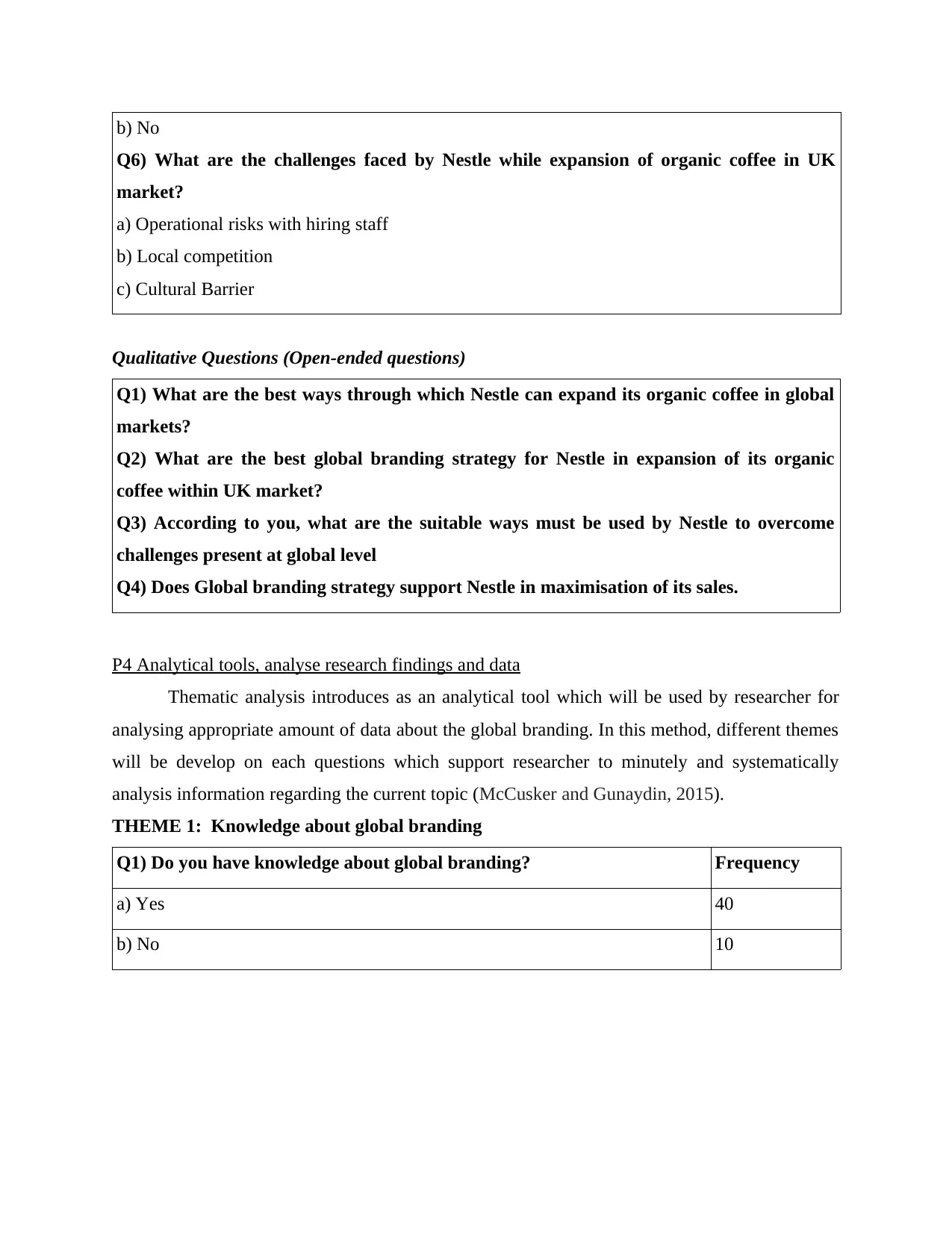
b) No
Q6) What are the challenges faced by Nestle while expansion of organic coffee in UK
market?
a) Operational risks with hiring staff
b) Local competition
c) Cultural Barrier
Qualitative Questions (Open-ended questions)
Q1) What are the best ways through which Nestle can expand its organic coffee in global
markets?
Q2) What are the best global branding strategy for Nestle in expansion of its organic
coffee within UK market?
Q3) According to you, what are the suitable ways must be used by Nestle to overcome
challenges present at global level
Q4) Does Global branding strategy support Nestle in maximisation of its sales.
P4 Analytical tools, analyse research findings and data
Thematic analysis introduces as an analytical tool which will be used by researcher for
analysing appropriate amount of data about the global branding. In this method, different themes
will be develop on each questions which support researcher to minutely and systematically
analysis information regarding the current topic (McCusker and Gunaydin, 2015).
THEME 1: Knowledge about global branding
Q1) Do you have knowledge about global branding? Frequency
a) Yes 40
b) No 10
Q6) What are the challenges faced by Nestle while expansion of organic coffee in UK
market?
a) Operational risks with hiring staff
b) Local competition
c) Cultural Barrier
Qualitative Questions (Open-ended questions)
Q1) What are the best ways through which Nestle can expand its organic coffee in global
markets?
Q2) What are the best global branding strategy for Nestle in expansion of its organic
coffee within UK market?
Q3) According to you, what are the suitable ways must be used by Nestle to overcome
challenges present at global level
Q4) Does Global branding strategy support Nestle in maximisation of its sales.
P4 Analytical tools, analyse research findings and data
Thematic analysis introduces as an analytical tool which will be used by researcher for
analysing appropriate amount of data about the global branding. In this method, different themes
will be develop on each questions which support researcher to minutely and systematically
analysis information regarding the current topic (McCusker and Gunaydin, 2015).
THEME 1: Knowledge about global branding
Q1) Do you have knowledge about global branding? Frequency
a) Yes 40
b) No 10
⊘ This is a preview!⊘
Do you want full access?
Subscribe today to unlock all pages.

Trusted by 1+ million students worldwide
1 out of 27
Related Documents
Your All-in-One AI-Powered Toolkit for Academic Success.
+13062052269
info@desklib.com
Available 24*7 on WhatsApp / Email
![[object Object]](/_next/static/media/star-bottom.7253800d.svg)
Unlock your academic potential
Copyright © 2020–2026 A2Z Services. All Rights Reserved. Developed and managed by ZUCOL.





